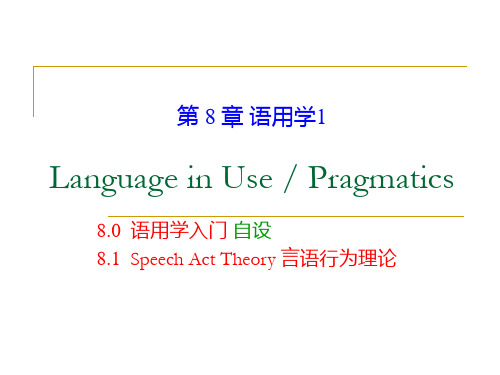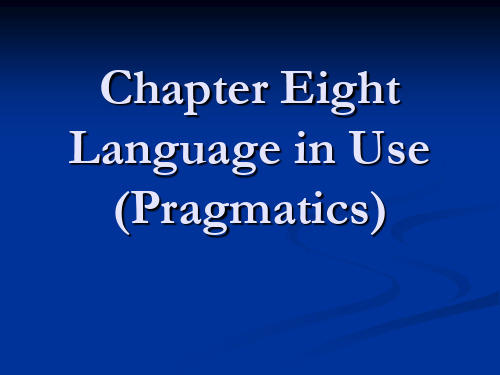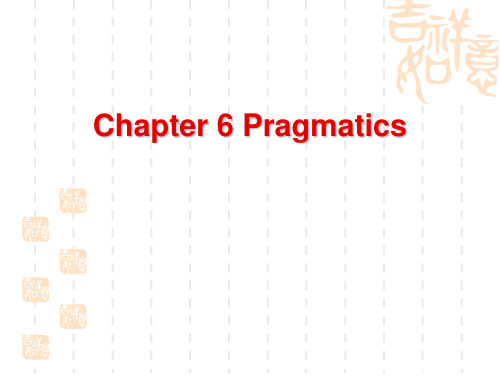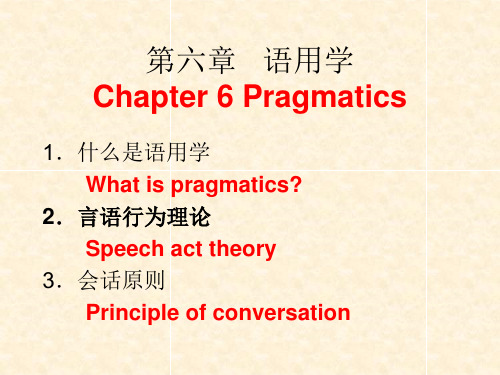英语语言学 语用学共101页文档
语言学教程语用学

in which it is actually uttered or used. ③So it is
possible to tell if The dog is barking is a sentence or an
each other. ④Context determines the speaker’s use of
language and also the hearer’s interpretation of what is
said to him. ⑤Without such knowledge, linguistic
utterance. ④It can be either. ⑤It all depends on how
we look at it and how we are going to analyze it.
⑥If we take it as a grammatical unit and consider it as
第 8 章 语用学1
Language in Use / Pragmatics
8.0 语用学入门 自设
8.1 Speech Act Theory 言语行为理论
8.0
语用学入门
Definitions of Pragmatics
①Pragmatics is the study of meaning in context. ②
s, pragmatics is concerned with the ways language is
used to communicate rather than the way language is
英语语言学第八章 语用学 pragmatics ppt课件

How to Do Things with Words (1962)
speech acts: actions performed via utterances
Constatives vs. performatives Constatives: utterances which roughly serves
Semantic meaning: the more constant, inherent side of meaning
Pragmatic meaning: the more indeterminate, the more closely related to context
2. Speech Act Theory
(ii) the relevant participants and circumstances must be appropriate.
B. The procedure must be executed correctly and completely.
C. Very often, the relevant people must have the requisite thoughts, feelings and intentions, and must follow it up with actions as specified.
Minister: addressing the groom) (Groom’s Name), do you take (Bride’s Name) for your lawful wedded wife, to live together after God’s ordinance, in the holy estate of matrimony? Will you love, honor, comfort, and cherish her from this day forward, forsaking all others, keeping only unto her for as long as you both shall live?
英语语言学 6 语用学

because the speakers understand each other’s illocutionary acts: ▪ (1) Making a request of his wife to go and answer the phone. ▪ (2) A refusal to comply with the request; issuing a request of her husband to answer the phone instead. ▪ (3) Accepting the wife’s refusal and accepting her request, meaning “all right, I’ll answer it.”
▪ 言语行为一词源于哲学家J. L. Austin(1962)的著作,现
在用来指一种理论,该理论分析话语在人际交往中与说 话者和听话人的行为之间的关系。它旨在回答 “我们在 使用语言时究竟在做什么?”这个问题。
Two types of utterances
▪ Constatives (叙述话语) ---- statements that either state or describe, and are thus verifiable;
Some basic notions in Pragmatics
▪ Pragmatics vs. Semantics 语用学与语义学
▪ Context 语境
▪ Sentence meaning vs. utterance meaning 句子意义和话语意义
第六章 语用学

第六章 语用学 Chapter 6 Pragmatics
1.什么是语用学 What is pragmatics? 2.言语行为理论 . Speech act theory 3.会话原则 Principle of conversation
1.什么是语用学 What is pragmatics?
• 1.1定义 • 语用学研究的是语言使用者是如何使用句子成功进行交际的。 它不是孤立地去研究语义,而是把语义置于使用语境中去研究的 一门学科。 • Pragmatics can be defined as the study of how speakers of a language use sentences to effect successful communication.语 用学研究的是说某种语言的人怎样用句子去实现成功的交际。 • As the process of communication is essentially a process of conveying meaning in a certain context, pragmatics can also be regarded as a kind of meaning study. It places the study of meaning in the context in which language is used. 由于交际的 过程从本质来说是在一定的语境中表达意义的过程,因而语用学 的本质是一种意义研究。它是一种将语言置于使用的语境中去的 意义研究。
语言学Pragmatics语用学

Fresh salad refers to the customer who ordered fresh salad.
Teacher: You can borrow my Shakespeare. Waiter: the ham sandwich left without paying. Nurse: The hernia(疝气)in room 5 wants to talk to the
A: Can I look at your Chomsky?
B: Sure, it’s on the shelf over there.
Chomsky refers to the book written by Chomsky. Waiter 1: Where’s the fresh salad sitting?
Person
Person
deixis
deixis
• You’ll have to bring
it
back
tomorrow Temporal deixis
because she isn’t Person deixis
Spatial deixis
Temporal deixis
here today.
All the deictic expressions have to be interpreted in terms of which person, place or time the speaker has in mind. We make a broad distinction between what is marked as close to the speaker(this, here, now) and what is distant(that, there, then), we can also indicate whether movement is away from the speaker’s location(go) or toward the speakers location(come).
语用学课件整理稿(英文)

语用学课件整理稿(英文)What is pragmatics?Pragmatics is a systematic way of explaining language use in context [Context is generally considered as constituted by the knowledge [knowledge of the language they use, knowledge of what has been said before, knowledge about the world in general, knowledge about the specific situation in which linguistic communication is taking place, and knowledge about each other) shared by the speaker and the hearer.]It seeks to explain aspects of meaning which cannot be found in the plain sense of words or structures, as explained by semantics. As a field of language study, pragmatics is fairly new. Its origins lie in philosophy of language and the American philosophical school of pragmatism. As a discipline within language science, its roots lie in the work of (Herbert) Paul Grice on conversational implicature and the cooperative principle, and on the work of Stephen Levinson, Penelope Brown and Geoff Leech on politeness. Pragmatics is a subdiscipline of linguistics developed from different linguistics, philosophical and sociological traditions that studies the relationship between natural language expressions and their uses in specific situations. The term pragmatics comes from Morris? (1938) general theory of signs: in this semiotic model (semioti cs), pragmatics refers to the relationship of the sign to the sign user. The distinction between pragmatics and semantics, both of which investigate different aspects of linguistic meaning, is even less clear-cut. While semantics is concerned with the literal and contextually non-variable meaning of linguistic expressions or with the contextually non-variable side of the truth conditions of propositions or sentences, pragmatics dealswith the function of linguistic utterances and the propositions that are expressed by them, depending upon their use in specific situations (pragmatics concentrates on those aspects of meaning that cannot be predicated by linguistic knowledge alone and takes into account knowledge about the physical and social world).Distinction between pragmatics and semantics1. same:linguistic studies of meaning2. differenceSemantics is concerned with the literal and contextually non-variable meaning of linguistic expressions or with the contextually non-variable side of the truth conditions of propositions or sentencespragmatics deals with the function of linguistic utterances and the propositions that are expressed by them, depending upon their use in specific situations.Sentence meaning v. utterance meaningIf we take it as a grammatical unit and consider it as a self-contained unit in isolation, then we treat it as a sentence. Sentence means a unit of speech constructed according to language-dependent rules, which is relatively complete and independent in respect to content, grammatical structure, and intonation.If we take it as something a speaker utters in a certain situation with a certain purpose, then we are treating it as an utterance. Utterance means a string of sounds or written symbols produced by a speaker between two pauses. An utterance can consist of a single word or several sentences.Meaning of a sentence is abstract, and de-contextualized.Meaning of an utterance is concrete, and contextualized.Utterance is based on sentence meaning; it is the realization of the abstract meaning of a sentence in a real situation of communication, or simply in a context.Summary●Language meaning can be analyzed at several levels.●Semantics concentrates o n the meaning that comes from linguistic knowledge, whilepragmatics concentrates on those aspects of meaning that cannot be predicted by linguistic knowledge alone and takes into account our knowledge about the physical and social world.●The focus of pragmatics analysis is on the meaning of speakers? utterances rather thanon the meaning of words or sentences.Utterances need not consist of complete sentences. Each utterance is a unique physical event created at a particular point in time for a particular communicative purpose.What does pragmatics mainly include?The lack of a clear consensus appears in the way that no two published accounts list the same categories of pragmatics in quite the same order. But among the things you should know about are:DeixisSpeech actsPresupposition and entailmentCooperation and implicatureRelevancePoliteness principleDeixisDeixis:The way in which the reference of certain elements ina sentence is determined in relation to a specific speaker and addressee and a specific time and place of utterance.Deictic expressions(指示结构)include such lexemes as:Personal or possessive pronouns (所有格代名词)(I/you/mine/yours),Demonstrative pronouns (this/that),(Spatial/temporal) adverbs (here/there/now),Other pro-forms(替代词)(so/do),Personal or possessive adjectives (my/your),Demonstrative adjectives(指示形容词)(this/that) ,Articles (the).Pro-forms:(替代词)forms which can serve as replacements for different elements in a sentence.A: I hope you can come.B: I hope so.A: Mary is in London.B: John is there too.We invited Mary and John to eat with us because we liked them.A: I like coffee.B: We do too.Two kinds of usages of deixisGestural usage(手势型的用法): with the help of gestures, with some physical indication of the referent (e.g. direction of gaze), completely context-dependent.He is not the president. He is. He?s the secretary.Symbolic usage(象征型的用法): with the help of contexts (Gestures are not necessary.We should know the time, space, participants, etc. The communicators are not necessarily present.)This city is highly congested.Non-deictic usages of deixisEndophoric reference(文内照应): the entity(实体)the deixis refers to exists in the sentence/ passage, the purpose of the use of deixis is for cohesion(粘连). Mostly third person (single, plural) is used for endophoric reference.e.g.: Peter studies Japanese. He wishes to go to Japan some day.We were led into a big room. Here, it was said, Ford produced his first car.Exophoric reference(文外照应): the entity the deixis refers to does not exist, and the referential meaning can be judged from the context. Mostly first and second person (single, plural) is used for exophoric reference.e.g.: He?s not the president. He is. He?s the secretary.You can come with me if you like.Some deixis belongs neither to endophoric reference nor to exophoric reference, it doesn?t exist in a context or discourse(文篇), for example “we”, “you” which do not refer to specific persons; “here”, “there” used in some set expressions, e.g. “Here we are”,”There wego”.gestural usageexophoric referenceDeixis symbolic usageendophoric reference: cohensionCategories of Deixis2.3.1 Person DeixisDeixis depending on the identity of speakers, addressees, and others.1) The basic grammatical distinctions are the categories of first, second and third person ——speaker inclusion, addressee inclusion, speaker and addressee inclusion. [Some pronominal systems exhibit as many as fifteen basic pronouns (ignoring honorific alternates) by superimposing distinctions based on plurality, gender and so on.]2) The first and second person pronouns are usually used in exophoric reference; the third person pronouns (single and plural) are usually used in endophoric reference.e.g. You can come with me if you like.You can never tell what sex some teenagers are nowadays.John came in and he lit a fire.3) Third is quite unlike first and second person, in that it does not correspond to any specific participant-role in the speech event.4)Vocatives(呼语)can be divided into calls, or summonses(呼唤语)and addresses (称呼语). The distinction is precisely that between gestural and symbolic usages.Summonses are naturally untterance-initial, addresses are parenthetical and can occur in the sorts of locations that parentheticals can occupy.E.g Hey you, you just scratched my car with your Frisbee. (calls)The truth is, Madam, nothing is as good as nowadays. (addresses)4) It is common in many languages for mother to say to father, in the presence of little Billiesomething like “Can Billie have an ice-cream, Daddy?” taking the view, for the purpose of vocative selection, of the audience. These distinctions make it important that we do notconfuse the categories of addressee and hearer.5) In many languages, there are two first person “plural” pronouns corresponding to“we-inclusive-of addressee” (包括谈话对方)and “we-exclusive-of addressee”. (不包括谈话对方)E.g. Let us know the time of your arrival. (exclude the addressee)Let?s go to the cinema. (include the addre ssee)您安心养病吧!我们过几天再来看您。
语用学PPT
1.5.5 interrelationship of utterance meaning and force
there are two components of speaker meaning--utterance meaning and force, the two components of speaker meaning are closely related, but not inseparable.
e.g. A:It's cold here. B:yes,it's so cold. C:“the weather is so hot outside." D:“i am cold" Do you know what does D mean?
1.5.3 understanding force but not utterance meaning
1.6.2 utterance iபைடு நூலகம்terpretation
The utterance interpretation definition of pragmatics focuses almost exclusively on the process of interpretation from the point of view of the hearer.
eg. Is that your car?
Is the speaker expressing admiration or expressing scorn? Is it a complaint that your car is blocking the drive? Is the speaker request a lift into town?
英语语言学 语用学 Pragmatics
The essential distinction between semantics and pragmatics is whether the context of use is considered in the study of meaning.
6.1.2 pragmatics and semantics
related but different linguistic studies of meaning both study meaning
Semantics treats meaning as an abstract, self contained, intrinsic system, a property attached to language itself, which is not influenced by context.
研究语言使用者是如何使用句子成功进行交际 的
It is a discipline of studying meaning not in isolation, but in context.
Pragmatics: the study of linguistic acts and the contexts in which they are performed
因此在研究语义时是否考虑语境便成了传统语 义学和语用学的根本区别所在。
如 It is cold in here 这个句子,对传统语义学 家来说,只是表达了“某一地点气温比较低” 这样的命题内容。而对语用学家来说,除了陈 述一个客观的气温情况外,说话人很可能是为 了请听话人做点什么,如关上窗户、打开暖气、 借件衣服御寒等。
英语语言学--语用学
Later, Austin realized that such distinction is not scientific, because all sentences can be used to do things. “saying is performing”. In some senses, constatives are also performatives. “ I state that I’m alone responsible.”
2012-5-21
5
Pragmatics includes the study of : (a)How the interpretation and use of utterances depends on knowledge of the real world. (b)How speakers use and understand speech acts b How (c)How the structure of sentences is influenced by the relationship between the speaker and the hearer.
2012-5-21
18
Performatives 施 为 句 —an utterance which performs an acts
eg. “Do you take this man/woman to be your lawful wedded husband/wife?” “I do ” is uttered in response to the priest’s question in the course of a marriage ceremony.
语言学_Chapter 6_Pragmatics
对所使用语言的掌握 语言知识
对语言上文的了解 百科全书式的知识(常识)
语境
背景知识
语言外知识 情景知识
特定文化的社会规范 特定文化的会话规则 交际的时间、地点 交际的主题 交际的正式程度 交际参与者的相互关系
相互知识Biblioteka • 1. Situational context
• • • •
refers to the particular spatiotemporal situation in which an utterance occurs the place and time of the utterance, the speaker and the hearer, the actions they are performing at the time, the various objects and events existent in the situation.
performed via utterances • 3 simultaneous act in a speech act
6.2.1 Austin’s model: Speech Acts (言语 行为理论)
Austin (1962) distinguish two categories of utterances.
Annie: Cats were very happy today.
I think Annie means “Cats eat the cream.” What does Annie mean? Cats today were in high spirit.
Both are right. It is the difference between sentence meaning and utterance meaning!
